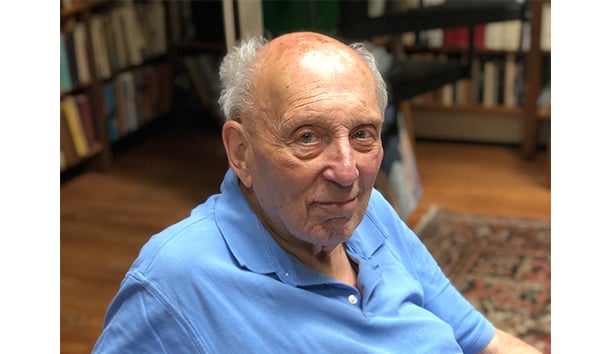In the beginning was the Word.
(Not the picture. Or the number.)
—John Lukacs,
“The Reality of Written Words,”
Chronicles (January 1999)
The last time I visited John Lukacs at Pickering Close, his home just outside of Phoenixville, Penn., he greeted me in Hungarian. My knowledge of that language is confined to goulash and paprikash and the proper pronunciation of Budapest, so I was a bit unsettled as we made our way to his library, and John offered me a chair, still in Hungarian. He finally noticed my bewilderment and shook his head slightly. “Of course—you don’t know Hungarian,” he said, smiling, in his lugubrious cadence. “We’ll speak in English.” And we did for hours, except for moments when we simply sat and enjoyed each other’s company.
I first met John Lukacs in 1992, two years after I had devoured The Passing of the Modern Age (1970), Confessions of an Original Sinner (1989), and his magnum opus, Historical Consciousness (1968). I brought him in to speak at The Catholic University of America, as part of a lecture series I had put together that also included Russell Kirk, and I used my connections with both men to convince Kirk to publish a third edition of Historical Consciousness, as much for my benefit as for the greater good. Back in those pre-Amazon days, it was much harder to locate copies of out-of-print books. In my remaining years at CUA, and then at Chronicles, John and I became correspondents, interlocutors, and finally friends.
In my column and in my reviews of his books for Chronicles, I have frequently noted how important John’s work was in my own intellectual development. I have written virtually nothing since 1990 that wasn’t influenced in some way by John’s writing. My own historical consciousness, and my understanding of philosophy and theology, flow from deep engagement with his work.
But it goes beyond that, to my very choice of words and the construction of my sentences. Because I learned from John that every action, no matter how small, is a moral choice, and that includes the words we use and our intentions in using them.
“[T]he purpose of the historian,” Lukacs wrote in Historical Consciousness, “should be the reduction of untruth.” But in that purpose the historian should be no different from the rest of us—or rather, we should be no different from him. The great tragedy here at the end of the modern age is the widespread loss of concern for the truth and the consequent degradation of language. According to Lukacs, if the words we choose aren’t consciously designed to reveal the truth as best we understand it, then they will conceal it—intentionally or unintentionally. One does not have to immerse oneself in our degraded political rhetoric to see the reality of Lukacs’s insight. In this age of social media, we float in a sea of words that are used, not to draw us closer to the truth, but to create alternate unrealities.
To say that John was obsessed with words gives the wrong impression. But he saw that, at the end of this age, “for large masses of people, verbal images and verbal imagination seem gradually to be replaced by pictorial images and pictorial imagination.” A picture, we are told, is worth a thousand words, but as Lukacs understood, that that says nothing about the relative ability of pictures and of words to express or conceal the truth:
[W]ords are not the symbols of things: They are symbols of meanings. And the meaning of meaning is that it carries our minds not only deeper, but further. Meaning is not mechanical or determined; it is spiritual and teleological. It is no longer sufficient for us to recall that the Greek word “logos” means both “word” and “reason.” We may have to understand that our recognition of the word as a symbol of meaning amounts to an enrichment of our reasoning.
As John and I talked in his library that morning late last July, he asked me a question that, at first, filled my heart with sorrow: “Tell me, Scott, is this the first time that we have met in person?” While we had continued our correspondence and phone calls, it had been 10 years since we had last seen each other, in that very space.
As I reminded him of our many meetings, it became clear that, while his visual memory had faded along with his eyesight, he remembered our words, repeating verbatim large portions of our conversations and correspondence. By the time I left John in his chair in the library he had designed and built and filled with 18,000 handpicked volumes over the course of a lifetime, my sorrow had turned to joy, even though I knew that we had spent our last day together. In the beginning was the Word. And in the end, for John Lukacs, the Word remained.



Leave a Reply